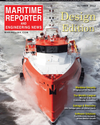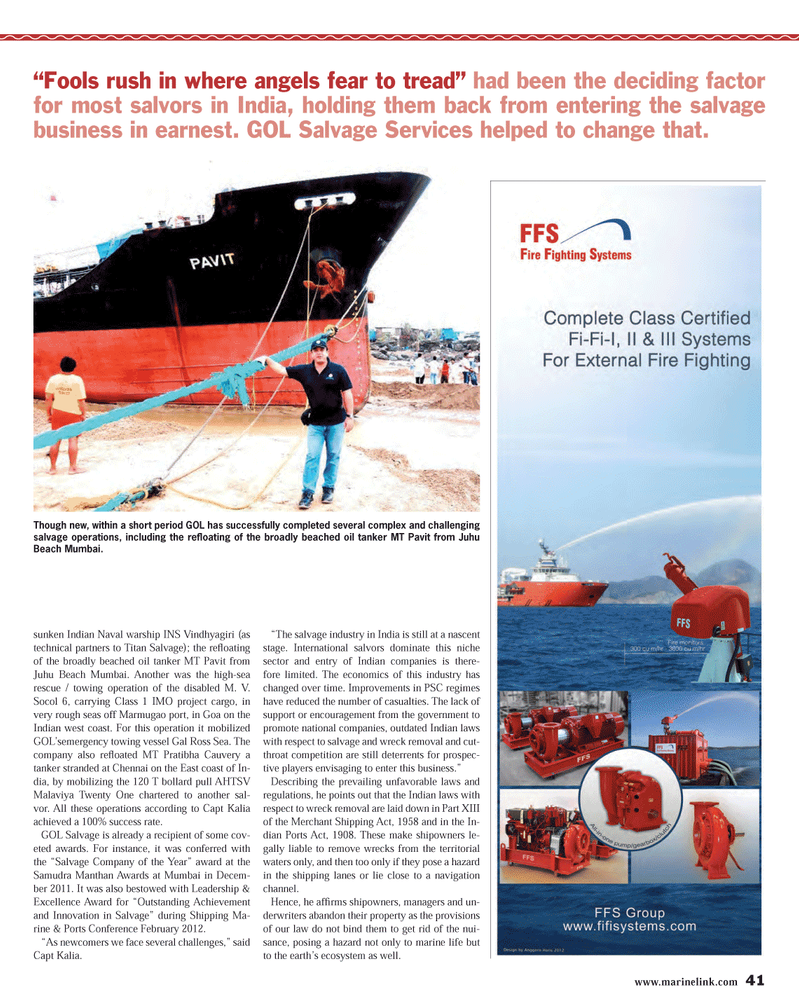
Page 41: of Maritime Reporter Magazine (October 2013)
Marine Design & Construction
Read this page in Pdf, Flash or Html5 edition of October 2013 Maritime Reporter Magazine
www.marinelink.com 41sunken Indian Naval warship INS Vindhyagiri (as technical partners to Titan Salvage); the re ß oating of the broadly beached oil tanker MT Pavit from Juhu Beach Mumbai. Another was the high-sea rescue / towing operation of the disabled M. V. Socol 6, carrying Class 1 IMO project cargo, in very rough seas off Marmugao port, in Goa on the Indian west coast. For this operation it mobilized GOL?semergency towing vessel Gal Ross Sea. The company also reß oated MT Pratibha Cauvery a tanker stranded at Chennai on the East coast of In-dia, by mobilizing the 120 T bollard pull AHTSV Malaviya Twenty One chartered to another sal- vor. All these operations according to Capt Kalia achieved a 100% success rate.GOL Salvage is already a recipient of some cov- eted awards. For instance, it was conferred with the ?Salvage Company of the Year? award at the Samudra Manthan Awards at Mumbai in Decem- ber 2011. It was also bestowed with Leadership & Excellence Award for ?Outstanding Achievement and Innovation in Salvage? during Shipping Ma-rine & Ports Conference February 2012.?As newcomers we face several challenges,? said Capt Kalia. ?The salvage industry in India is still at a nascent stage. International salvors dominate this niche sector and entry of Indian companies is there-fore limited. The economics of this industry has changed over time. Improvements in PSC regimes have reduced the number of casualties. The lack of support or encouragement from the government to promote national companies, outdated Indian laws with respect to salvage and wreck removal and cut-throat competition are still deterrents for prospec-tive players envisaging to enter this business.?Describing the prevailing unfavorable laws and regulations, he points out that the Indian laws with respect to wreck removal are laid down in Part XIII of the Merchant Shipping Act, 1958 and in the In- dian Ports Act, 1908. These make shipowners le- gally liable to remove wrecks from the territorial waters only, and then too only if they pose a hazard in the shipping lanes or lie close to a navigation channel. Hence, he afÞ rms shipowners, managers and un- derwriters abandon their property as the provisions of our law do not bind them to get rid of the nui-sance, posing a hazard not only to marine life but to the earth?s ecosystem as well. ?Fools rush in where angels fear to tread? had been the deciding factor for most salvors in India, holding them back from entering the salvage business in earnest. GOL Salvage Services helped to change that. Though new, within a short period GOL has successfully completed several complex and challenging salvage operations, including the reß oating of the broadly beached oil tanker MT Pavit from Juhu Beach Mumbai. MR #10 (34-41).indd 41MR #10 (34-41).indd 4110/2/2013 4:23:47 PM10/2/2013 4:23:47 PM

 40
40

 42
42
